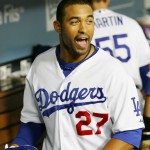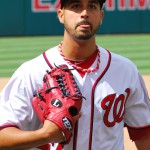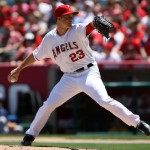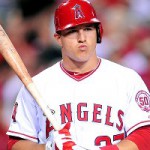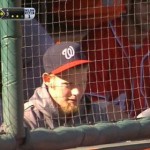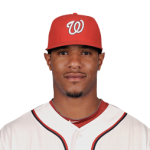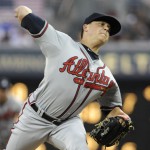
Harper makes perfect sense to represent the US in 2013 WBC. Photo GQ magazine Mar 2012
I read a quickie piece with some Mike Rizzo quotes from the Washington Time’s beat reporter Amanda Comak on November 11th, 2012 and there was an interesting tidbit at the bottom: per Comak, Rizzo has not been approached yet about any Washington Nationals participation in the WBC, but would approach each request on a “case-by-case basis” to determine what is in the best interests of the team. This got me thinking about possible Nats representatives on 2013 WBC teams.
Lets take a quick look at the Nationals representatives on WBC teams from the past, talk about whether its really in the best interests of the team to even let these guys play, and then talk about who may be candidates for the 2013 WBC regardless.
(Note: I’ve added updates highlighted in red since the original 11/21/12 publication date on players mentioned here).
Washington has sent a decent number of players to play in the WBC over the years, with very mixed results for the team’s interests. In 2006 the team sent seven different players to the inaugural WBC:
- Luis Ayala for Mexico
- Chad Cordero, Gary Majewski and Brian Schneider for team USA
- Ronnie Belliard, Alberto Castillo, and Wily Mo Pena for the Dominican Republic.
The tournament was marred for the team by a blown UCL ligament to Ayala, who had undergone elbow surgery earlier in the off-season but pitched for his home country anyway. The team did not want Ayala to participate in the inaugural event, did not want him used by the Mexican team, and team officials were “livid” by the injury, which cost Ayala the season and cost the team its 8th inning setup guy. Ayala recovered to pitch again in 2008 but was never as effective, and was shipped out in 2009 for a PTBNL. Coincidentally, I suspect the team still harbors some ill-will towards Ayala to this day. Meanwhile the other two relievers who participated both experienced regressions in form; Cordero’s ERA nearly doubled (from 1.82 to 3.19) from his breakout 2005 season while Majewski’s numbers dipped slightly before he was traded in the big Cincinnati deal of 2006.
In 2009, the team had 5 participants:
- Pete Orr playing for Canada
- Joel Hanrahan and Adam Dunn playing for the USA
- Saul Rivera and Ivan Rodriguez playing for Puerto Rico.
The WBC seemed to energize particularly Dunn, who enjoyed playing in a post-season atmosphere for the first (and only) time in his career. Nobody suffered any injuries, but Hanrahan in particular may have been affected by his lack of a proper spring training; he posted a 7.71 ERA for the team while losing the closer spot and was shipped to Pittsburgh. Ironically, Rivera also experienced a huge regression of form, going from a 3.96 ERA in 2008 to a 6.10 ERA in 2009 and was eventually released.
This begs the question; do we even WANT our pitchers playing on this team? The first two WBCs have shown pretty distinctly that our pitchers have regressed greatly after playing. This only makes sense: the spring training routines are greatly impacted to play in this event. We may see a ton of front-office resistance to specific guys (especially those coming off injury) playing in the 2013 event. Which could affect the eligibility of some specific players for 2013.
Now, which Nats may play for the 2013 teams? First off, looking at the Nationals 40-man roster, we have become an amazingly heavy USA-born team (we’ll get to non-40man roster players in a moment). Thanks to the Nats big board resource (originated by Brian Oliver and now maintained by “SpringfieldFan”), which has the country of origin for players, here’s a breakdown of the home-country of our current 36 active (as of November 15th, 2012) roster players:
- USA: 27 (would be 29 if adding in our rule-5 avoidance players)
- Venezuela: 5 (Jesus Flores, Sandy Leon, Wilson Ramos, Henry Rodriguez, and Carlos Rivero)
- Cuba: 1 (Yunesky Maya)
- Columbia: 1 (Jhonatan Solano)
- Dominican Republic: 1 (Eury Perez)
- Netherlands (via Curacao): 1 (Roger Bernadina)
As you can see, the massive bulk of our team is USA born, and essentially our entire post-season starting roster was USA born as well. That doesn’t necessarily mean that these USA-born players will actually play for team USA (Alex Rodriguez played for Puerto Rico despite being born and raised in Miami, and our own Danny Espinosa is eligible to play for Mexico by virtue of his first-generation born in the US status), but almost all of these guys will be up for consideration for the USA team. And this only accounts for our 40-man players; as we’ll see below there’s plenty of lower-minors players from smaller countries that will participate.
Who from the Nationals franchise may make a 2013 WBC roster? First off, thanks to James Wagner‘s 11/15/12 NatsJournal post we already know of three WBC participants; Solano is on the Columbian team, minor leaguer Jimmy Van Ostrand is on the Canadian team, and A-ball catcher Adrian Nieto is on the Spanish team. Curacao qualifies to play with the Netherlands, and I’d guess that Bernadina would make a great choice considering the lack of Dutch players in baseball (Baseball Continuum’s projections agree. And as of 12/4/12 he’s officially been listed as a Netherlands participant).. Venezuela is already qualified for the main draw and has a relatively strong possible team. The Baseball Continuum blog posted an early projection of the Venezuelan team and listed Flores as a likely participant (specifically mentioning that Ramos wasn’t considered due to injury recovery; I’d suspect these two players to switch based on Ramos’ recovery and Flores’ awful 2012). If Henry Rodriguez was healthy i’d guess he would be on that list too, but his season-ending surgery probably precludes his participation. The Dominican Republic has perhaps the strongest depth and has no need for the recently called up Perez among its outfield depth. Maya’s defection eliminates him from discussion for the Cuban team. (12/4/12 update): Chien-Ming Wang has been announced as a member of Chinese Taipei’s team (for the purposes of this article I investigated all 2012 Nats).
Which leaves our large contingent of American players. A couple of writers have started postulating on these rosters (David Schoenfield‘s very early guess as to a potential USA roster is here, Baseball Continuum’s latest projection is here). So using these two posts as a starting point, lets go position-by-position and give some thoughts as to who may get some consideration. Keep in mind the WBC rosters are generally very reliever heavy, since no starter is going to be “allowed” to pitch a complete game in March.
(Note: I’m still considering our Free Agents as “Nats players” for the purposes of this analysis, since this really goes position by position from our 2012 team to find candidates).
- Catcher: Kurt Suzuki isn’t nearly in the class of the likes of Buster Posey, Brian McCann, Joe Mauer, or Matt Weiters. There are a ton of quality american backstops right now.
- First Base: Free Agent Adam LaRoche probably faces far too much competition from the likes of Prince Fielder, Paul Konerko, Adam Dunn, Allen Craig, Eric Hosmer, and Mark Teixeira to make this team. If it were me, I’d go with Fielder and Teixeira. But, LaRoche’s great 2012 season and his Gold Glove recognition may get him a spot. He is a FA though, so i’d guess he won’t commit until he signs and gets the go-ahead from his new team. Or, perhaps he uses the WBC to showcase himself? Not likely needed; he should sign long before the WBC kicks off in March.
- Second Base: Danny Espinosa is a decent player, but not in the same league as Shoenfield’s projection of Dustin Pedroia and Ben Zobrist. Brandon Phillips is also in the mix for the team.
- Shortstop: Ian Desmond‘s breakout 2013 season may get him some consideration. There’s not a lot of American quality short stops out there. Troy Tulowitzki is the obvious leading choice (as was Derek Jeter in the first two WBCs), but is he ready to come back from injury? Looking around the majors there are a couple other possibilities (JJ Hardy, Brendan Ryan, Jimmy Rollins and Brandon Crawford all could be alternatives as well). I think Desmond’s combination of offense and defense, combined with Tulowitzki’s injury recovery could get him on the team.
- Third Base: Ryan Zimmerman cannot break the hegomony of David Wright and Evan Longoria right now, even given Longoria’s injury struggles this season. Chase Headley and David Freese are also in the 3b mix. 12/4/12 update: Apparently Wright is committed, Longoria is out due to injury recovery and Headley “was not asked,” so perhaps Zimmerman is back in the mix.
- Outfielders: I think Bryce Harper is a natural to make this team, not only on talent but also because of the brand-name recognition (and TV ratings and fan interest) it would generate. Same goes for Mike Trout. Otherwise there’s a slew of top-end american players who can man the outfield and they read like the top of the MVP boards: Braun, Kemp, McCutchen, Stanton, Hamilton, and Granderson are all candidates to make this team. 12/6/12 update: Scott Boras has stated that Harper will skip the WBC to focus on his sophomore season.
- Starters: The two logical Nats candidates to be considered would be Gio Gonzalez and Stephen Strasburg. But lets be honest; there is no way in hell Strasburg would be allowed to play. Could Gonzalez make this team? Given the depth of American starter talent right now (just off the top of my head: Verlander, Lincecum, Cain, Hamels, Halladay, Kershaw, Lee, Weaver, Sabathia, Medlen, and so on) perhaps this will be a selection of attrition moreso than a selection of availability. So if a number of the older guys on this list beg out, perhaps Gio gets his shot. The WBC’s location in San Francisco has already lead to Ryan Vogelsong committing to play in his home town, and could lead to other Bay Area players signing up. I’m not sure any of the rest of our starters are really candidates, given the reputations of the above list plus the reliever-heavy nature of the roster.
- Relievers: our two most well known relievers (Tyler Clippard and Drew Storen) are possibilities; would the Nats block Storen based on his 2012 injury? Craig Stammen‘s breakout 2012 season could get him looks, based on the reliever-heavy needs of the team. Normally Sean Burnett may be in the loogy mix, but there’s better lefty relievers out there AND Burnett’s FA status may lead him to bow out to curry favor to his new team (Schoenfeld lists Burnett as a possible member back in July, before knowing he’s declared free agency). The question is, would you take Clippard/Storen against the likes of this list of quality american back-of-the-bullpen arms: Kimbrel, Ventors, Marshall, League, Janssen, Papelbon, Hanrahan, Motte, Boggs, Bailey, Reed, and Nathan? Possibly, considering that a lot of these guys probably bow out. We’ve sent multiple relievers to each of the past two WBCs and its likely going to be the same thing this year.
Summary: here’s my guesses as to which Nats (and recent ex-Nats) will play in the WBC:
- Venezuela: Ramos
- Spain: Nieto
- Canada: Van Ostrand
- Columbia: Solano
- Netherlands: Bernadina
- Chinese Taipei: Wang
- USA: Harper, Desmond, Gonzalez, Clippard. Perhaps Zimmerman and Stammen.
March 2013 update: here’s the post-WBC actual list of participants when all was said and done, helped by the list of rosters via Wikipedia. MLB reports that nine (9) Nationals are participating in the classic, though the below list (excluding Wang) totals more. They’re not counting Solano/Columbia, having lost in the preliminaries.
- Columbia: Jhonatan Solano (AAA/Mlb in 2012)
- Spain: Adrian Nieto (low-A in 2012)
- Canada: Jimmy Van Ostrand (AA in 2012)
- Italy: Matt Torra, Mike Costanzo (both AAA in 2012, Washington MLFA signings for 2013)
- Netherlands: Roger Bernadina, Randolph Oduber (high-A in 2012)
- Chinese Taipei: Chien-Ming Wang (former Nat, non-signed FA for 2013 start of season)
- USA: Gio Gonzalez, Ross Detwiler
- Dominican Republic: Eury Perez (3/4/13 addition to DR team)
